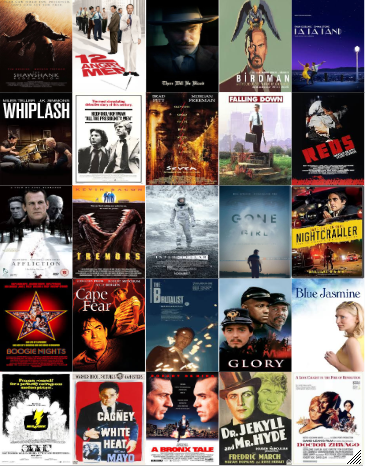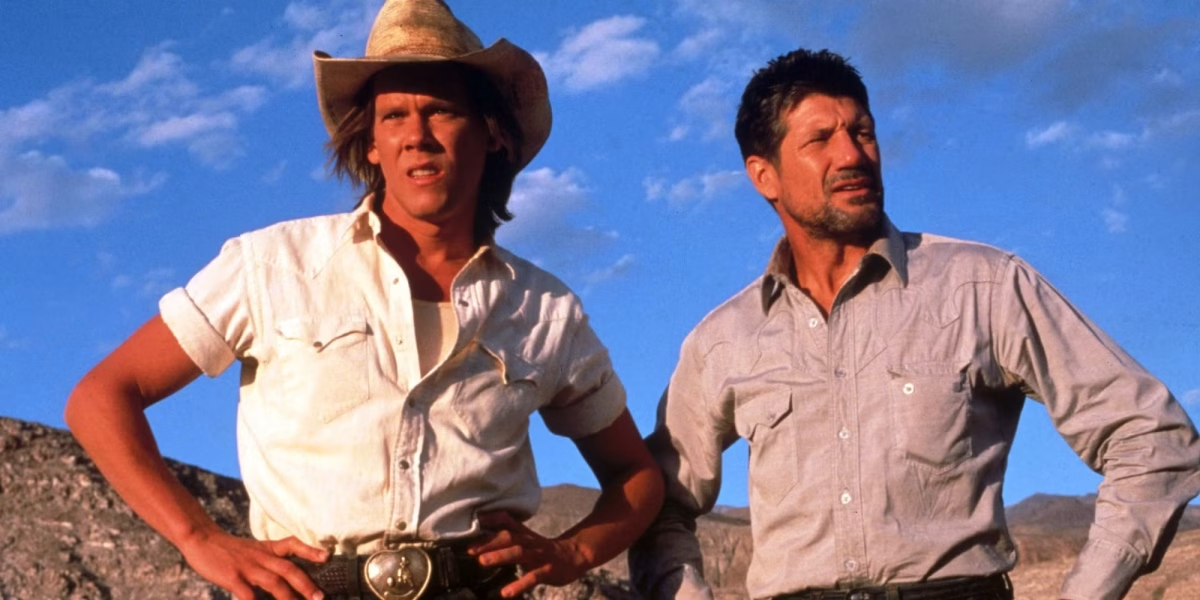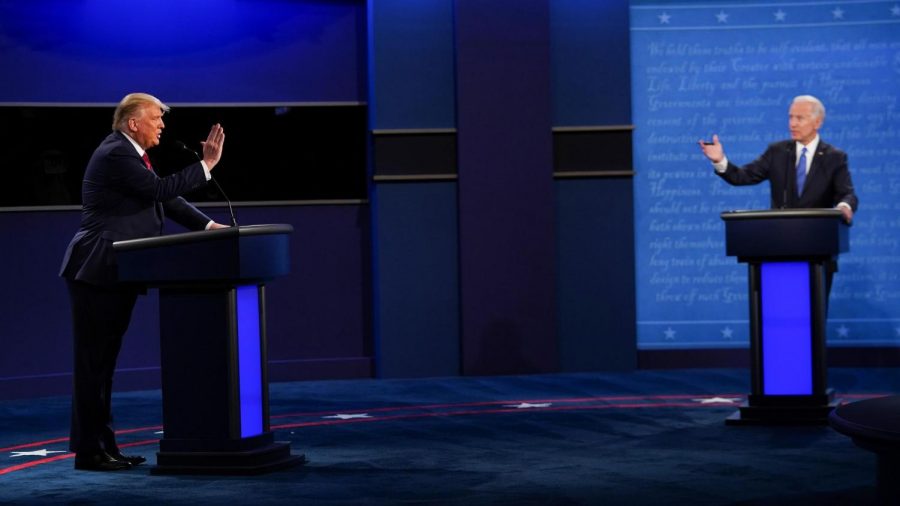Closing Remarks: The Second Presidential Debate
At the final presidential debate of the 2020 campaign, President Donald Trump (left) sparred energetically with former Vice President Joe Biden (right), though the introduction of a new mute button kept the crosstalk which had plagued the last debate to a minimum. In the final stretches of the campaign, Trump sought to rebrand himself, promising economic recovery and a swift end to the pandemic. Biden, on the other hand, made several progressive policy commitments in immigration and climate change, a departure from his generally risk-averse strategy. Photo credits: Brenden Smialowski / Getty Images.
In a campaign of surprises, 2020 has perhaps offered up the greatest surprise yet with the second and final presidential debate on October 22: a coherent, cogent discussion of the issues. After the explosive first debate in September between incumbent President Donald Trump and former Vice President Joe Biden, pundits despaired, with many warning that the future of debates themselves were up in the air. Thanks to the effective moderation of Kristen Welker of NBC News at, aided by the threat of the newly added mute button for the candidates, those fears were assuaged and some semblance of normalcy restored.
From a stage at Belmont University in Nashville, Tennessee, the two candidates sparred over a wide array of issues, from the COVID-19 pandemic to the economy to climate change, mostly avoiding the crosstalk and insults that characterized the last debate. That is not to say the two candidates refrained from personal attacks—far from it, in fact. Nonetheless, Trump’s comparatively more disciplined performance indicates a new urgency at a critical junction of the campaign. With 47 million people having already voted, and trailing in the polls, Trump has once more slipped into the familiar position of the underdog, reflected by his restraint at the debate.
The opening segment of the debate was dedicated solely to the COVID-19 pandemic, which is a major area of weakness for the president. Days after the first debate, Trump tested positive for the virus, along with many members of his inner circle, and skipped the original second debate scheduled for October 15th after the commission insisted on a virtual format. With over 220,000 Americans dead and cases surging in the crucial Midwestern region, the president struck an optimistic tone, nonchalantly stating “there was some spikes and surges and other places, they will soon be gone. We have a vaccine that’s coming. It’s ready.” He continued by describing his own experience fighting the virus, and breezily promised “we’re rounding the turn. We’re rounding the corner. It’s going away.”
Biden promptly pounced, replying that “Anyone is responsible for that many deaths should not remain as president of the United States of America.” He touted an endorsement from the New England Medical Journal and described his plan for a national mask mandate, producing his own and waving it about for effect. Trump responded with familiar lines of counterattack, describing how Biden initially opposed his ban on travel from China for being “xenophobic”, and calling for schools to reopen based on the low transmittal rate to teachers. Where Trump struck a different angle, though, was his description of CDC Director Dr. Anthony Fauci — “I get along very well with Anthony”, he said at one point. This new attitude from Trump, who has sparred publicly with Fauci on several occasions, again reflects the president’s new political calculus in the face of sagging popularity.
After the mostly cogent first segment of the debate, the two candidates began sparring again minutes later in the second topic, focusing on national security. Trump and Biden traded accusations of corruption, with Biden first condemning Trump for alleged softness on Russia, especially his refusal to confront Russian President Vladimir Putin over bounties placed on American soldiers in Afghanistan. Trump retaliated by claiming “Joe got $3.5 million from Russia and it came through Putin, because he was very friendly with the former mayor of Moscow” and criticizing the Obama administration’s response to the Russian invasion of Crimea in 2014.
Soon, the topic pivoted from Russia to China, with Biden describing new allegations of Trump’s business dealings in China by claiming Trump “paid 50 times the tax in China” compared to the taxes he paid in the United States, calling on Trump to “release your tax return or stop talking about corruption”. Trump brushed off the attack, claiming that his taxes were still under audit and describing his Chinese bank account as being “a businessman doing business.” He then alluded to the allegations about Biden’s son Hunter receiving money from China, claiming “they even have a statement that we have to give 10% to the big man. You’re the big man, I think.” The chaotic segment closed with both candidates accusing each other of being soft on North Korea, until Welker shifted the conversation onto healthcare and the economy.
In his most vocal championing of healthcare to date, Biden pledged that he would “pass Obamacare with a public option, and become Bidencare”, creating a government-run alternative to private insurance. Trump criticized Biden’s plan for being “socialized medicine” and tried to tie him with liberal figures in the Democratic party like his primary opponent Senator Bernie Sanders, provoking Biden into snapping, “I beat all those other people because I disagreed with them.” Another more progressive policy position that Biden staked out was commitment to raising the federal minimum wage to $15, upon which Trump scoffed, “Alabama is different than New York. New York is different from Vermont. Every state is different. It should be a state option.”
Generally, while Trump stuck closer to the mainstream of American politics in this debate, Biden cautiously inched leftwards on policy positions. While Biden’s strategy over the past two years has been to attach himself to the Obama administration, he chose to distance himself on the key issue of immigration. Biden admitted, “we made a mistake… It took too long to get it right.” Trump, meanwhile, tried to tie Biden to the Obama administration as closely as possible. When questioned about his administration’s infamous child separation policy, Trump repeatedly asked, “Who built the cages, Joe?” He further slammed the Obama administration’s catch-and-release policy, where illegal immigrants were allowed to stay in the United States until their court date, claiming that only “those with the lowest IQ” would show up to their trial.
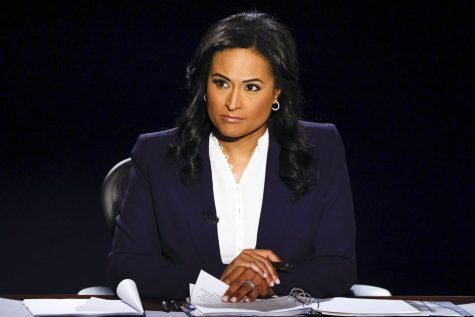
As the night went on, the president seemed to lose his fear of the mute button and became more emboldened, interrupting more often and returning to his distinctive pugnacious style. During the topic about race relations in America, at one point he loudly claimed, “I am the least racist person in this room.” Biden rebutted by sarcastically calling Trump “Abraham Lincoln here is one of the most racist presidents we’ve had in modern history”, before describing again Trump’s past comments about Latinos, Muslims, and African-Americans. Biden, however, was likewise confronted with his questionable past record on race, especially the controversial 1994 crime bill. Biden again admitted “it was a mistake. I’ve been trying to change since then”, provoking Trump into again blasting Biden’s record, calling him “all talk and no action.”
In the debate’s final segment, which revolved around climate change, Trump touted again his achievements in securing the “cleanest crystal clear water, the cleanest air…the best lowest number in carbon emissions.” He compared the American environment to China, Russia, and India’s “filthy” air to justify his rejection of the Paris Climate Accord. Biden, meanwhile, struck a more conciliatory approach, calling on America to take leadership in the climate crisis, such as investing in charging stations across the country “so that we can own the electric car market of the future”.
Trump again tried to tie Biden with his party’s left wing, especially Congresswoman Alexandria Ocasio-Cortez’s Green New Deal Plan, mocking it as being focused on “new buildings with little, tiny, small windows” and characterizing wind energy as “extremely expensive. Kills all the birds.” In a pivotal moment at the very end, Trump managed to corner Biden in terms of fracking policy, which the Democratic nominee has long been evasive about. Biden stated that he would “transition from the old industry”, prompting Trump to respond, “That’s a big statement,” and gloating, “Will you remember that Texas? Will you remember that, Pennsylvania, Oklahoma?”
The final question of the night in many ways was an effective summary of their two campaigns, a microcosm of the choice before America. Welker posed the same question to both candidates, asking what they would say in their inaugural address to Americans who did not vote for them. Trump touted the pre-pandemic economy—“We had the best Black unemployment numbers in the history of our country. Hispanic, women, Asian, people with diplomas, with no diplomas” and warned that if Biden won, “you will have a Depression, the likes of which you’ve never seen.” Biden, on the other hand, struck a more thoughtful tone, promising “I represent all of you, whether you voted for me or against me, and I’m going to make sure that you’re represented.” He closed with an urgent plea that “what is on the ballot here is the character of this country…decency, honor, respect.”
In what was arguably the two candidates’ strongest respective debate performances ever, the second and final presidential debate of the 2020 election season showed with greater clarity than ever before the competing visions of the two candidates. Walking back his earlier vitriol and presenting a far more restrained persona, Trump touted the pre-pandemic economy and promised an optimistic future for the COVID-19 pandemic, though his initial discipline had mostly worn down by the end. Conversely, Biden played it safe with delicate maneuvers around potentially polarizing issues, with noticeable movement leftward on immigration and environmental policy, while simultaneously appealing repeatedly to moderates. As the campaign draws to a close, Americans will be left with the most important decision of our lifetime: four more years, or a return to normalcy.
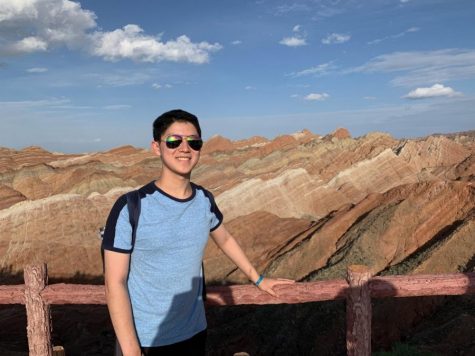
Vincent Jiang is currently a senior at West Morris Central High School and President of Journalism Club. Passionate about global affairs, he enjoys writing...





















